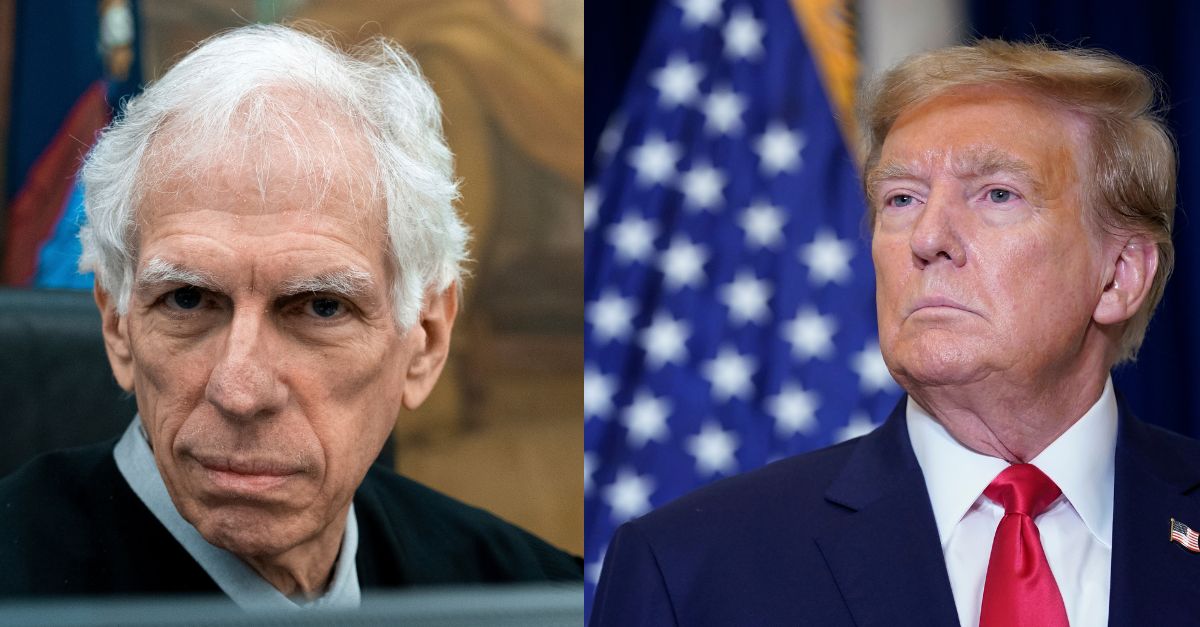
Left: Judge Arthur F. Engoron (Meir Chaimowitz/NurPhoto via AP). Right: Former President Donald Trump (AP Photo/Susan Walsh).
The judge who oversaw Donald Trump’s civil fraud trial has rejected a defense request to recuse himself from the case over a controversial conversation involving a New York City real estate attorney.
According to attorney Adam Leitman Bailey, he and New York Supreme Court Justice Arthur Engoron discussed Trump’s case at length during a hallway chat three weeks before the court issued a blockbuster ruling that found Trump as well as other individuals and entities liable to the tune of a combined $364 million. Inclusive of interest, Trump himself owes $454 million under the ruling.
Trump’s attorneys subsequently seized on Bailey’s claims and moved to have Engoron barred from any further proceedings.
On Thursday, the judge described the ex parte communication as “Unsolicited” and broadly irrelevant to his damages ruling.
The extensive damages ruling was based on a broad reading of New York Executive Law § 63 (12) — and underscored a previous, strongly-worded ruling in the state’s favor where Trump was found liable for fraud on motions for summary judgment.
Bailey, a legal analyst, revealed the discussion while talking with Manhattan-based NBC flagship station WNBC on Feb. 16, the same day the court issued its judgment. In May, those allegations came to light along with news that Engoron was under investigation by the New York State Commission on Judicial Conduct over the discussion.
The defense’s recusal motion soon followed suit.
Engoron begins his rejection of the recusal request by recounting the circumstances of the Bailey discussion.
“Sometime in or around February of this year, several weeks before I issued the Post-Trial Decision and Order, at the end of the business day, I left my robing room in the courthouse at 60 Centre Street and rode an elevator down to the main floor,” the judge’s version of events contained in the order begins. “There, on the outskirts of the famous rotunda, Bailey accosted me and started haranguing me about Executive Law § 63 (12). He did not relay any alleged facts.”
Prior to that meeting, the judge said, he “considered Bailey a professional acquaintance and a distant friend.”
The color commentary continues as Engoron uses a touch of invective to describe the apparently uncomfortable situation.
“His sudden appearance and vehement speed took me aback, and I simply told him that he was wrong,” the order goes on. “He trailed after me, still droning on, as I descended the Judge’s stairs to the street level. I entered my vehicle without saying another word.”
The criticisms of the attorney continued as the judge matched their respective legal knowledge against one another.
“For approximately three and a half years prior to this unpleasant occurrence, starting in September 2020, I had researched § 63 (12) intensely and had issued many rulings, including preliminary injunction and summary judgment decisions, based on it,” the order continues. “I certainly did not need a landlord-tenant lawyer ranting about it.”
In late June, the defense moved to have Engoron recused from the case. At the same time, the defense issued a broad subpoena request for documents in Bailey’s possession. Even later in June, Bailey’s own attorney moved to put a kibosh on the Trump team effort with a motion to quash the subpoena. Earlier this month, Engoron issued an order refusing to fully quash and remarking that the “subpoena is not wholly without merit.”
The judge, for his part, appeared to believe the full documentary record would vindicate his narrative of the Bailey chat.
“I did not initiate, welcome, encourage, engage in, or learn from, much less enjoy, Bailey’s tirade,” the order continues. “I did not base any part of any of my rulings on it, as Bailey has outlandishly, mistakenly, and defamatorily claimed.”
Engoron insists the entire incident took all of 90 seconds and was, in the end, a “nothingburger” that he would have forgotten about if not for Bailey using the instance to discuss the case with the media.
And, while a great deal of the court’s ire is reserved for the real estate attorney, the court also took the opportunity to criticize the defense for citing Bailey as the basis of the recusal motion — since Bailey himself was admittedly advocating a position that would have helped Trump and his namesake family business.
“Of course, the irony here is that defendants, whose position Bailey was ostensibly promoting, is moving for me to recuse myself, and plaintiff, whose position Bailey was ostensibly controverting, opposes the motion,” a footnote reads. “This suggests that defendants are not motivated by ethical concerns but, rather, seek an opportunity to reverse the trajectory and outcome of this case.”
Have a tip we should know? [email protected]









